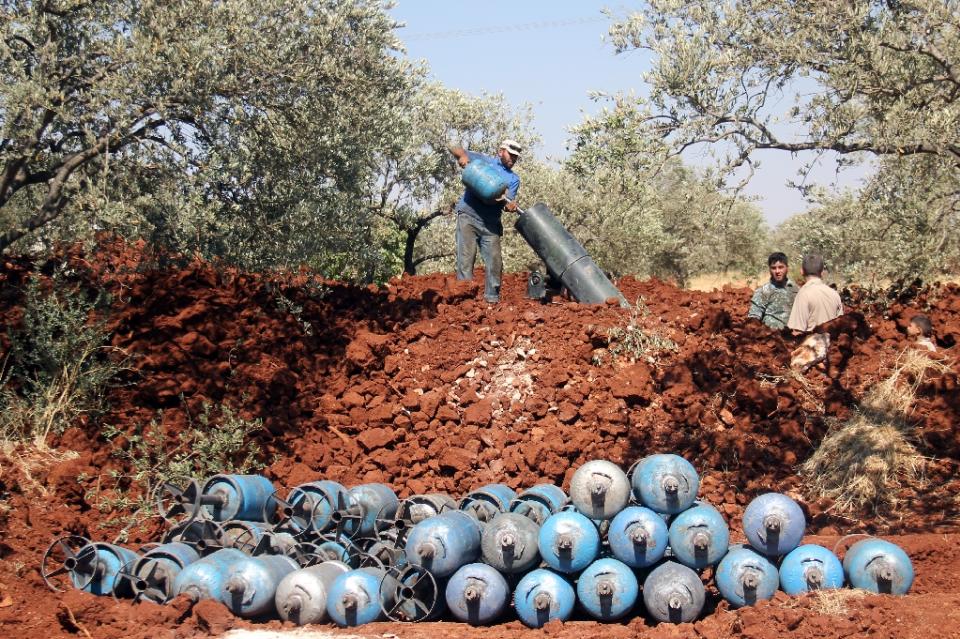The Indomitable Tyrant
"If we thought we will be victorious in all the battles everywhere at the same time ... this is unrealistic and impossible. We are forced to give up areas to move those forces to the areas that we want to hold on to."
"We are in a fateful phase with no half solutions.... Are the Syrian armed forces able ... to defend the homeland? Yes, it is certainly capable. But the army in the first degree is a matter of manpower which would then utilize the weapons and ammunition. Everything is available, but there is a lack of manpower."
"[Our sister nation] Iran only gave us military expertise, and as for our loyal brothers [Hezbollah] in the Lebanese resistance, they fought with us ... their blood combined with the blood of their brethren in the army and the armed forces."
"The homeland is not for those who live in it and who carry its passport or citizenship ... but is for those who defend it and protect it."
Syrian President Bashar al-Assad
 |
| Footage shown on Al-Manar shows the Barada-Zabadani road where Hezbollah blows up militant tunnels on July 22, 2015 -- Daily Star / Al Manar (HQ) |
Clearly, the 'homeland' is not for Syria's Sunni majority population. That would be the Syrians whose mild protest four years ago against inequality in citizenship the Alawite government of Bashar al-Assad responded to by arresting, imprisoning and torturing protesters, including children. The violence that the regime hurled against the Syrian Sunnis left them little option but to form themselves into rebel militias to fight back against the tyrant whose idea of citizenship obviously excluded them.
Like his father before him, al-Assad experienced no moral misgivings by using chemical weapons to punish Syrian civilians whom he believed were sympathetic to the Sunni rebels. Helicopter warships, artillery strikes, barrel bombs; no punishment too dire to deliver to the audacious Sunnis who dared contest his leadership qualities and the values inherent in an Alawite Shiite Baathist government. If the world thought that Iraq's Sunni Baathist Saddam Hussein was a barbarian, al-Assad has stepped into the breach left vacant by Saddam's departure in Iraq.
President al-Assad explained initially that those contesting his reign were thugs and terrorists and he had no option but to eradicate them. In the process he has overseen the deaths of over 200,000 people, the forced migration of millions of Syrians and the refugee status of millions more sheltering in Lebanon, Jordan and Turkey, glad to have escaped the chaos resulting from Assad's livid umbrage over Syrian Sunni challenges to his continued governance.
Those victories against the rebels and the foreign Islamists that filtered in droves into disintegrating Syria were achieved by government forces only because they had the aid of Hezbollah fighters and the battlefield strategic advice of Iran's al Quds generals and allied troops. Iran has generously shared with Syria Iraqi and Syrian Shia tribal jihadists willing and eager to comply with Iran's orders, anxious of their own accord to diminish the number of Sunnis in the Middle East.
 |
| A video grab from Al-Manar shows smoke billowing from buildings in Zabadani after being targeted by Hezbollah and Syrian army forces, Saturday July 4, 2015 -- The Daily Star/Al Manar |
Syrian army shortages are to the favour of the armed opposition. The pre-conflict strength of some 300,000 troops in the Syrian military has been cut in half after four years of fighting. Casualties numbering between 80,000 to 100,000, defections and desertions have taken their inevitable toll. The Syrian military is exhausted, and Hezbollah is in little better shape. War has decimated the Alawite minority community, leaving them unable to respond as recruits for the war that their leader initiated and cannot win.
The territorial control of the Syrian government is no more than 25 percent of the country now, the bulk of the geography taken by armed groups including ISIL, other rebel groups and the best organized of all, the Kurdish militia, according to the Syrian Observatory for Human Rights, tracking the trajectory of the war that has destroyed Syria. The state-controlled areas remain home to the majority of the population, however.
Iran has sent members of its Revolutionary Guards Corps to fight in Syria, sending as well irregular forces from Iraq and Afghanistan, mobilizing Shiite populations to go to battle as a noble undertaking against the Sunni opposition. President al-Assad's government has issued an amnesty for draft dodgers and soldiers who have defected, estimating that a few thousand might take advantage of the amnesty to re-enlist in the army.
President Bashar al-Assad heads a government under siege. One so complex with so many players that he has finally understood that it will take a miracle for him to overcome the forces arrayed against his ongoing rule in a country his vicious sectarian hatred and violent atrocities has destroyed.
 |
Labels: Conflict, Crisis Politics, Islamist, Shiite, Sunni, Syria

<< Home